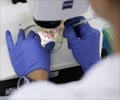Treatment, Prognosis and Complications of Chronic Granulomatous Disease (CGD)
Early diagnosis of CGD helps to start prophylactic measures; Patient education. Antibiotics like
Treatment goals include:
- Early diagnosis of CGD so as to start prophylactic measures.
- Patient education.
Antibiotics- Antibiotics like trimethoprim-sulfamethoxazole are often prescribed to prevent bacterial infections. This drug has the advantage of not tampering the normal bacterial flora of the digestive tract. Fungal infections are usually prevented using itraconazole. The utility of voriconazole for this purpose is under study.
Immunomodulation - has been in vogue as a standard treatment for CGD for a considerable time. Immune system is manipulated using drugs like interferons (in the form of interferon gamma-1b). They prevent infections in CGD patients by 70% and to reduce their severity.
Hematopoietic stem cell transplantation - is a curative technique though associated with risks. Surgical techniques may be required to relieve obstructions.
Prognosis
Failure to treat may result in death of an affected child within the first decade of life. Long term outcome of chronic granulomatous disease with modern treatment has not been thoroughly studied.
Complications
Kell antigens form a group of antigens on the human red blood cell surface. Gene deletions make patients with CGD sensitised to Kell antigens after blood transfusions, i.e. antibodies are produced against these antigens. This leads to complications after subsequent transfusions. Hence it is important to examine the Kell-antigen status in patients.















